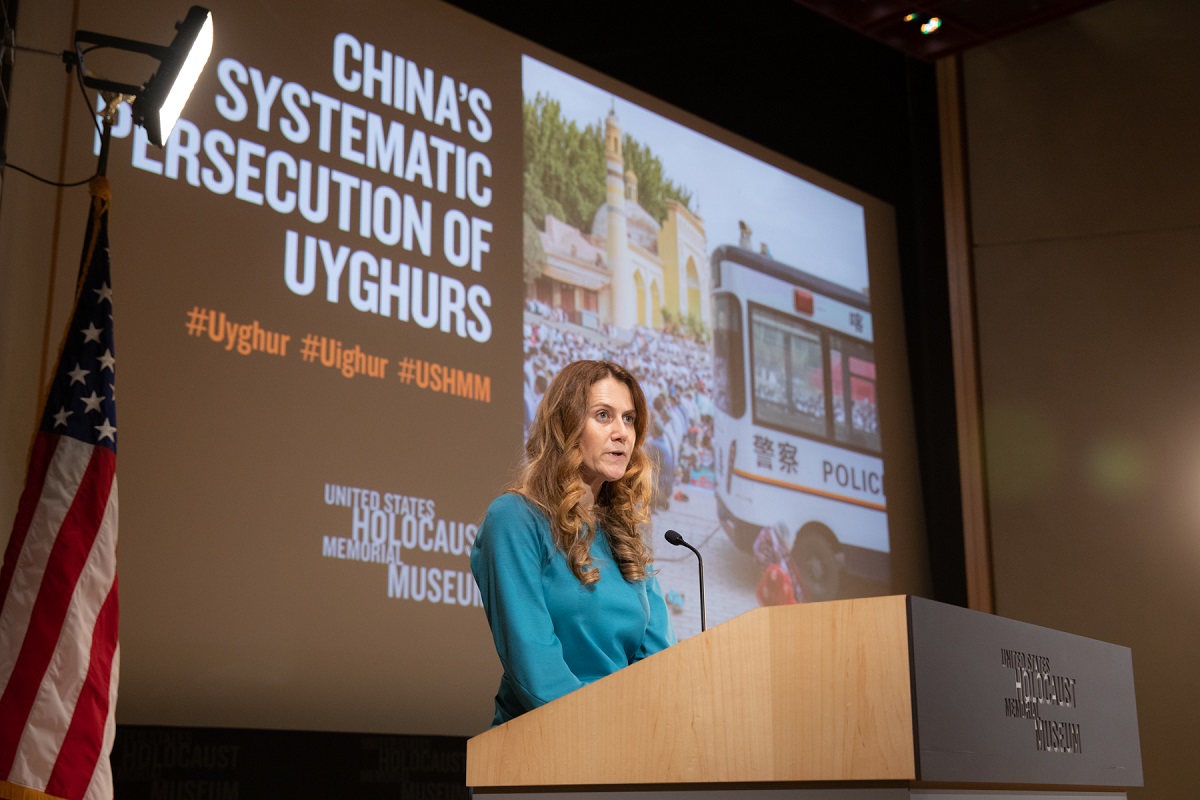March 06, 2020

Remarks as delivered by Naomi Kikoler, director of the Simon-Skjodt Center for the Prevention of Genocide, United States Holocaust Memorial Museum. March 5, 2020.
Good evening and welcome to the United States Holocaust Memorial Museum. I am Naomi Kikoler, the director of the Museum’s Simon-Skjodt Center for the Prevention of Genocide.
The Museum's founders, many of whom were Holocaust survivors, established a memorial museum that would commemorate the victims and survivors of the Holocaust and educate people about that unique event.
They also sought to create an institution that would do for people under threat today, what was not done for the Jews of Europe in the 30s and 40s.
This institution is dedicated to the promise of “never again.” And yet, 75 years after the Holocaust, people around the world face ongoing threats of genocide and related crimes against humanity.
Today, we are confronting the Chinese government’s systematic persecution and mass detention of the Uyghur and other Turkic Muslims populations in Xinjiang, a province in western China.
While the Uyghur community—a Muslim minority group of approximately 12 million people—has been targeted by the Chinese government for years, we have seen in recent times a deeply unsettling increase in this behavior and in their efforts to erase the community’s ethnic and religious identity.
The Chinese government is using sophisticated social and technological surveillance systems in order to control everyday aspects of Uyghur life, crack down on expressions of identity, and detain well over one million people.
To put that in context, that means that at least 1 out of every 12 Uyghurs in Xinjiang has been detained. Men, women, the elderly, and the young.
Newly leaked Chinese government documents suggest that ordinary acts, such as praying or traveling out of the country, could be enough to result in someone being put in detention. We may not know the exact details of what is happening in each detention center, but the first hand reports from detention are terrifying. Former detainees talk of political indoctrination, torture, forced labor, and even deaths in custody.
Perpetrators usually find some rationale for their crimes. In this case, the Chinese government claims to be fighting terrorism or eradicating poverty—but these are goals that cannot possibly be reached by the systematic persecution of the Uyghur population.
Our panelists here today have worked tirelessly to get information from Xinjiang—and they have shared how the Chinese government is undertaking a criminal campaign of persecution.
China’s systematic campaign against the Uyghur population is characterized by mass detention, forced labor, and discriminatory laws, and supported through high-tech manners of surveillance. There are reasonable grounds to believe that China is responsible for crimes against humanity. It is important to recall that crimes against humanity were born out of the experience of the Holocaust and first were prosecuted at Nuremberg. Every government has committed to protect their populations from crimes against humanity.
In this case, there is a reasonable basis to believe that the Chinese government is failing in this regard, and they are committing the crimes against humanity of persecution and imprisonment or other severe deprivation of physical liberty.
As shocking as these crimes are, they are not new. We have seen this kind of persecution on the basis of a group’s identity too often.
Our Museum special exhibition, “Americans and the Holocaust” tells the story of how ordinary Americans, as well as our leaders, responded to the rise of the Nazis and the Holocaust. Sadly, despite the abundance of information that was available to Americans at the time, rescuing Jews did not become a priority, except for a few individuals who took the risk to help.
There are important lessons to be learned from this history. Our Museum stands as a reminder that how we confront atrocities can send a message to persecuted groups around the world—as well as potential perpetrators.
When we consider the scale of the problem we are discussing today, it is hard to think of quick solutions. But there is always a role for each of us to play to shine a light on mass atrocities.
We need to press for the crimes against the Uyghurs to end, and recognize the courage of those—Uyghurs and others—who are fighting to make that a reality. We are honored that we will be hearing from some of them tonight.
View All Blog Posts